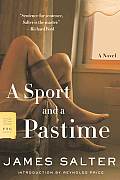Books |
James Salter: A Sport and a Pastime
By
Published: Aug 16, 2015
Category:
Fiction
James Salter labored under a curse.
He was considered a “writer’s writer” — that is, too good for the masses to appreciate. There are worse things to be called. Still, to be a “writer’s writer” for half a century…
It started with Salter’s 1967 breakthrough novel, “A Sport and a Pastime.” Two reviews in The New York Times praised the book — Reynolds Price called it “as nearly perfect as any American fiction I know,” Webster Schott described it as “a tour de force in erotic realism” — but it didn’t find a large audience. Instead, it became a “cult classic.” Sadly, it still is.
In fact, this is an addictively readable novel. [To buy the paperback from Amazon, click here. To buy the Kindle edition, click here.]
No one writes about France more lovingly than Salter; read a few paragraphs and you’ll want to buy a ticket. Not to Paris, though Salter gets its late nights and parties perfectly. To the small towns, the “real” France, where the smell of wood smoke is in the air and life is played out to the cadence of seasonal change.
Soon we are rushing along an alley of departure, the houses of the suburbs flashing by, ordinary streets, apartments, gardens, walls. The secret life of France, into which one cannot penetrate, the life of photographs albums, uncles, names of dogs that have died. And in ten minutes, Paris is gone. The horizon, dense with buildings, vanishes. Already I feel free.
In one of these towns, the unnamed narrator of this novel has borrowed the house of some rich friends. He is soon joined by Phillip Dean, an American dropout from Yale. Dean is a doom: a beautiful loser, a bundle of questions in search of answers he’ll never find. In such a condition, a man looks for solutions in love — well, in sex. And so it is that Dean selects a French shop girl as his erotic target. Anne-Marie, at once wise and innocent, cannot resist him. Soon they are creating their own encyclopedia of sex.
She cannot be satisfied. She will not let him alone. She removes her clothes and calls to him. Once that night and twice the next morning he complies and in the faint darkness between lies awake, the lights of Dijon faint on the ceiling, the boulevards still. It’s a bitter night. Flats of rain are passing. Heavy drops ring in the gutter outside their window, but they are in a dovecote, they are pigeons between the eaves. The rain is falling all around them. Deep in feathers, breathing softly, they lie.
Writing great sex is one of the hardest tricks in fiction. Salter succeeds brilliantly, in large part because he’s such a sensual writer to begin with. Surfaces fascinate him, he loves to observe. And, don’t forget, the book is written by a voyeur. [Is this a “dirty” book? Yes, in the sense that the prose inspires home movies in your head. No, in the sense that sex is an integral part of the book; it’s not there to titillate us.]
The last thing the reader of a 192-page book needs is a too-precise recounting of the plot. What happens to Dean, how Anne-Marie’s sexual education changes her — you’ll find out soon enough. But what will convince you that you must find out is the writing.
Mornings with clouds. Windy mornings. Mornings with black wind rushing like water. The trees quiver, the windows are creaking like a ship. It’s going to rain. After a while the first silent drops appear on the glass. Slowly they increase, cover it, begin to run. All of Autun beneath the cool, morning rain, the sculptures on the Roman gates streaking and then turning dark, the slate roofs gleaming now, the cemetery, the bridges across the Arroux. Every once in a while the wind returns, the rain moves sideways, beats against the windows like sand. Rain falling everywhere, on all the avenues and enterprises, the ancient glories of the town. Rain on the plate glass of the Librairie Lucotte, rain on les Arcades, on au Cygne de Montjeu. A long, even rain that makes me quite content.
Cool prose, every word chosen, re-considered, affirmed. Mannered? Only until you get used to it. Then the world falls away and the book itself dissolves, and you are taken over by its characters.


